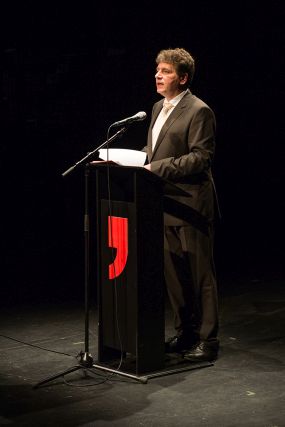
Marcel Beyer
- Germany
- Zu Gast beim ilb: 2014
Marcel Beyer was born in 1965 in Tailfingen in Baden-Württemberg and grew up in Kiel and Neuss. He studied German, English and Literature in Siegen and received his Master of Arts, presenting a thesis on Friederike Mayröcker. He worked as an editor (amongst others, on the series, »Vergessene Autoren der Moderne« (tr. Forgotten Authors of Modernity) and as an editor of the literary magazine »Concepts« as well as writing regularly for »Spex« magazine.
Beginning with the biological allegory of a carnivorous plant, his debut novel, »Das Menschenfleisch« (1991; tr. The Human Flesh), interweaves linguistics and romance. Sometimes manic, the narrator’s monologues seek by means of a private language to assimilate his mistress. Quotes from other art forms are incorporated into this stream of consciousness. A characteristic of Beyer’s work, his conception of language as material, can be found already in this first work. His understanding that everything said or written constitutes a vast body of »word material« which borders on unfathomability. »Flughunde« (1995; tr. Flying Foxes) concentrates on the phonetic dimension of historical metafiction and lets the narrative voices of Goebbels’ eldest daughter and the acoustician Hermann Karnau converge in the Führerbunker. In 2013, the novel was adapted by comic artist Ulli Lust as a graphic novel. »Spione« (2000 tr. Spies) is also characterized by the imaginary, in this case images and gaps in a family photo album which provide the basis for the reconstruction of an individual’s involvement in historical atrocities. The time span of »Kaltenburg« (2008) extends from the immediate post-war period until the fall of the Berlin Wall and illuminates in subjective review the biography of an eccentric naturalist. A spontaneous outburst following a visit to the outskirts of Dresden stands at the beginning of Beyer’s brilliantly comprehensive collection of essays and prose sketches »Putins Briefkasten« (2012; tr. »Putin’s Letterbox«). The most recent volume of poetry, »Graphit« (2014; tr. Graphite) brings together poems from the past decade. Sceptical of the opposing discourses and currents defining genre, he opts instead for a polyphony of jargon and specialised language, integrating into his free verse words that have fallen into obsolescence. Versatile, inspired and placing new demands on his own artistic creation, this anthology shows how wholeheartedly Beyer retains an avant-garde attitude.
Amongst other awards he has received the Berlin Literature Prize (1996), the Heinrich Böll Prize (2001) and the Friedrich Hölderlin Prize (2003). He has also served as writer in residence at University College London and at the University of Warwick in Coventry. In 2014 Beyer was awarded the Kleist Prize. In this context the Oskar Pastior Prize was also conferred upon him. Beyer lives in Dresden.
Das Menschenfleisch
Suhrkamp Frankfurt a. M., 1991
Flughunde
Suhrkamp Frankfurt a. M., 1995
Kaltenburg
Suhrkamp Frankfurt a. M., 2008
Putins Briefkasten Acht Recherchen
SuhrkampBerlin, 2012
Graphit
SuhrkampBerlin, 2014
